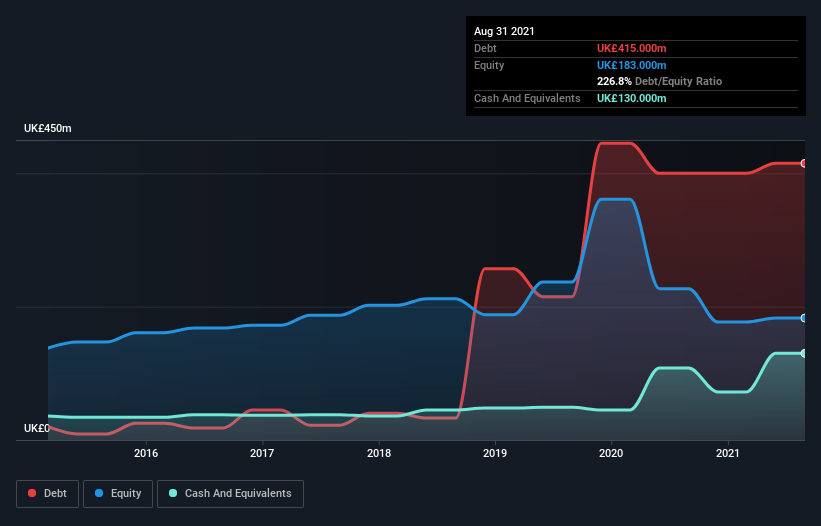
Some say volatility, rather than debt, is the best way to think about risk as an investor, but Warren Buffett famously said that 'Volatility is far from synonymous with risk.' When we think about how risky a company is, we always like to look at its use of debt, since debt overload can lead to ruin. Importantly, WH Smith PLC (LON:SMWH) does carry debt. But is this debt a concern to shareholders?
When Is Debt A Problem?
Generally speaking, debt only becomes a real problem when a company can't easily pay it off, either by raising capital or with its own cash flow. Part and parcel of capitalism is the process of 'creative destruction' where failed businesses are mercilessly liquidated by their bankers. However, a more common (but still painful) scenario is that it has to raise new equity capital at a low price, thus permanently diluting shareholders. By replacing dilution, though, debt can be an extremely good tool for businesses that need capital to invest in growth at high rates of return. When we think about a company's use of debt, we first look at cash and debt together.
Check out our latest analysis for WH Smith
How Much Debt Does WH Smith Carry?
As you can see below, WH Smith had UK£415.0m of debt, at August 2021, which is about the same as the year before. You can click the chart for greater detail. However, it does have UK£130.0m in cash offsetting this, leading to net debt of about UK£285.0m.

A Look At WH Smith's Liabilities
Zooming in on the latest balance sheet data, we can see that WH Smith had liabilities of UK£376.0m due within 12 months and liabilities of UK£791.0m due beyond that. Offsetting these obligations, it had cash of UK£130.0m as well as receivables valued at UK£35.0m due within 12 months. So its liabilities total UK£1.00b more than the combination of its cash and short-term receivables.
While this might seem like a lot, it is not so bad since WH Smith has a market capitalization of UK£1.87b, and so it could probably strengthen its balance sheet by raising capital if it needed to. But we definitely want to keep our eyes open to indications that its debt is bringing too much risk. When analysing debt levels, the balance sheet is the obvious place to start. But ultimately the future profitability of the business will decide if WH Smith can strengthen its balance sheet over time. So if you're focused on the future you can check out this free report showing analyst profit forecasts.
In the last year WH Smith had a loss before interest and tax, and actually shrunk its revenue by 13%, to UK£886m. That's not what we would hope to see.
Caveat Emptor
Not only did WH Smith's revenue slip over the last twelve months, but it also produced negative earnings before interest and tax (EBIT). Indeed, it lost UK£30m at the EBIT level. When we look at that and recall the liabilities on its balance sheet, relative to cash, it seems unwise to us for the company to have any debt. So we think its balance sheet is a little strained, though not beyond repair. We would feel better if it turned its trailing twelve month loss of UK£82m into a profit. So we do think this stock is quite risky. The balance sheet is clearly the area to focus on when you are analysing debt. But ultimately, every company can contain risks that exist outside of the balance sheet. We've identified 3 warning signs with WH Smith , and understanding them should be part of your investment process.
If you're interested in investing in businesses that can grow profits without the burden of debt, then check out this free list of growing businesses that have net cash on the balance sheet.
Valuation is complex, but we're here to simplify it.
Discover if WH Smith might be undervalued or overvalued with our detailed analysis, featuring fair value estimates, potential risks, dividends, insider trades, and its financial condition.
Access Free AnalysisHave feedback on this article? Concerned about the content? Get in touch with us directly. Alternatively, email editorial-team (at) simplywallst.com.
This article by Simply Wall St is general in nature. We provide commentary based on historical data and analyst forecasts only using an unbiased methodology and our articles are not intended to be financial advice. It does not constitute a recommendation to buy or sell any stock, and does not take account of your objectives, or your financial situation. We aim to bring you long-term focused analysis driven by fundamental data. Note that our analysis may not factor in the latest price-sensitive company announcements or qualitative material. Simply Wall St has no position in any stocks mentioned.
About LSE:SMWH
WH Smith
Operates as a travel retailer in the United Kingdom, North America, Australia, Ireland, Spain, and internationally.
Reasonable growth potential second-rate dividend payer.
Similar Companies
Market Insights
Community Narratives




